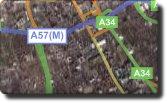Why I lost Interest in CSS-Discuss
RANT STARTS HERE
CSS-Discuss is probably the most prolific mailing list when it comes to Web design and cascading style sheets (CSS) in particular. It is a broad group with high traffic of messages circulation. I subscribed to it earlier this year due to admiration for Eric Meyer — possibly the man behind this mailing list and the man to provide us with a Web-based presentation tool better known as S5.
[CSSD] avoids off -topic discussions like general (X)HTML, accessibility and particular Web-related applications. However, I am put back by the dull, useless, non-reusable discussions in that group. Much of the conversation traffic gets ‘wasted’ on cross-platform site checks and dealing with known browser bugs (rather than CSS as a standard). Almost every single day one would see entire threads about rendering of pages in different browsers — something along the lines of this fictitious paragraph:
In IE, the border is drawn one pixel above that which I see in FF so if I look closely enough I can see some small speckles in my menu. Having said that, it only becomes visible if I use this particular arcane browser.

To sum up, my final advice is to avoid this mailing list unless it resides on a separate E-mail account. It might be relevant if you wish to discuss bugs attributed to browser developers or if you want to wind up opening various Web sites in different computers and occasionally giving a nod to the OP, which acknowledges acceptable page rendering.
RANT ENDS HERE






 Filed under:
Filed under: 
 uto-responders, also referred to as “vacation messages”, are a valuable feature of E-mail accounts. These are not only helpful when an account gets checked irregularly, but also when it becomes deprecated.
uto-responders, also referred to as “vacation messages”, are a valuable feature of E-mail accounts. These are not only helpful when an account gets checked irregularly, but also when it becomes deprecated. Certain ever-lasting trends in society worry me. While there is less smiling and degradation in terms of affectionate social patterns, anywhere you turn you see excessive compulsive laughter (often in public places over the telephone) as well as fake, polite laughs. [that's my genuine laugh on the right, circa 1984] Fake laughter has become a fundamental asset to girls who flirt. A man might say the darnest thing and some girls would still voluntarily giggle. Guys likewise, but as a straight man, I have no evidence. Either way, this fabricated temperament is becoming a norm.
Certain ever-lasting trends in society worry me. While there is less smiling and degradation in terms of affectionate social patterns, anywhere you turn you see excessive compulsive laughter (often in public places over the telephone) as well as fake, polite laughs. [that's my genuine laugh on the right, circa 1984] Fake laughter has become a fundamental asset to girls who flirt. A man might say the darnest thing and some girls would still voluntarily giggle. Guys likewise, but as a straight man, I have no evidence. Either way, this fabricated temperament is becoming a norm.























 definitely enjoy running my Web log, but
definitely enjoy running my Web log, but